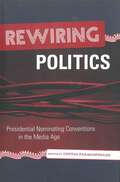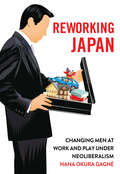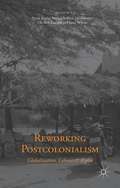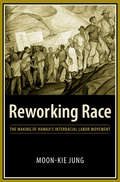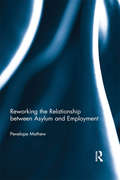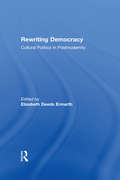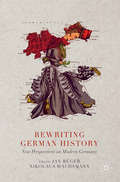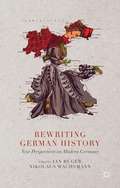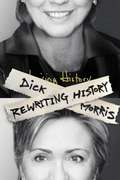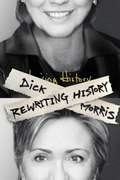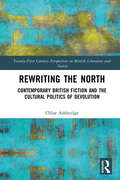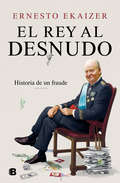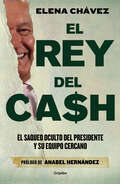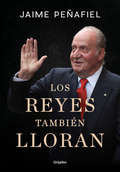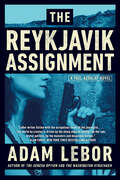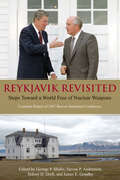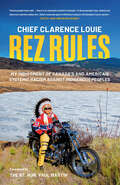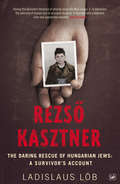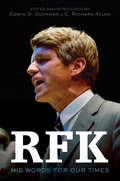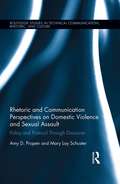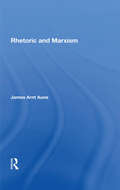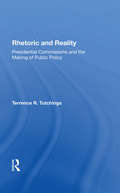- Table View
- List View
Rewiring Politics: Presidential Nominating Conventions in the Media Age (Media & Public Affairs)
by Costas PanagopoulosA century ago, national political parties' nominating conventions for U.S. presidential candidates often resembled wide-open brawls, filled with front-stage conflicts and back-room deals. Today, leagues of advisors precisely plan and carefully script these events even though their outcomes are largely preordained. Rewiring Politics offers the first in-depth exploration of the profound changes in the nominating process to focus on the role of the media. Fourteen luminaries from the worlds of media and politics examine how the technology of "coverage" has transformed conventions over time. As the contributors demonstrate, the story of the evolution of the nominating process cannot be told without the concomitant story of the revolution in mass media.The impact of the media on political conventions has received surprisingly little scholarly attention. Yet few aspects of the American political process have faced such radical alterations in such a short period of time. From the first live television broadcast from a national convention on June 21, 1948, during the Republican convention in Philadelphia, through the advent of cable networks and the Internet, both the presentation and the content of the nominating process has been transformed. Today, because the party's nominee is selected before the event, candidates use their conventions-and convention coverage-as a form of advertising. They design mega-media events to electrify the party faithful and to woo undecided voters by dazzling them.Without a doubt, the contributors conclude, conventions still matter, though their role has changed over the past decades. Rewiring Politics helps readers assess the evolution of conventions in contemporary politics and addresses the implications of these changes on our parties, politics, and society.
Reworking Japan: Changing Men at Work and Play under Neoliberalism
by Nana Okura GagnéReworking Japan examines how the past several decades of neoliberal economic restructuring and reforms in Japan have reshaped the nation's corporate ideologies, gender ideologies, and subjectivities of individual employees. With Japan's remarkable economic growth since the 1950s, the lifestyles and life courses of "salarymen" came to embody the "New Middle Class" family ideal. As Nana Okura Gagné demonstrates, however, the nearly three decades of economic stagnation since the bursting of the economic bubble in the early 1990s has tarnished this positive image of salarymen. In a sweeping appraisal of recent history, Gagné shows how economic restructuring has reshaped Japanese corporations, workers, and ideals, as well as how Japanese companies and employees have responded to such changes.Gagné explores Japan's fraught and problematic transition from the postwar ideology of "companyism" to the emergent ideology of neoliberalism and the subsequent large-scale economic restructuring. By juxtaposing Japan's economic history with case studies and life stories, Gagné goes beyond the abstract to explore the human dimension of the neoliberal reforms that have impacted the nation's corporate governance, socioeconomic class, workers' ideals, and gender relations. Reworking Japan, with its firsthand analysis of how the supposedly hegemonic neoliberal regime does not completely transform existing cultural frames and social relations, will shake up preconceived ideas about Japanese men in general and salarymen in particular.
Reworking Postcolonialism
by Pavan Kumar Malreddy Birte Heidemann Ole Birk Laursen Janet WilsonAn interdisciplinary collection of essays, Reworking Postcolonialism explores questions of work, precarity, migration, minority and indigenous rights in relation to contemporary globalization. It focuses on the impact of global market forces on the formation of new subject positions among urban dwellers, exiles, and other disenfranchised communities. Bringing together political, economic and literary approaches to texts and events from across the postcolonial world, the essays collected here investigate the transformative effects of the global dissemination of capital and goods and the movements of people. They call for a revision of existing discourses on rights, entitlements and citizenship.
Reworking Race: The Making of Hawaii's Interracial Labor Movement
by Moon-Kie JungIn the middle decades of the twentieth century, Hawai'i changed rapidly from a conservative oligarchy firmly controlled by a Euro-American elite to arguably the most progressive part of the United States. Spearheading the shift, tens of thousands of sugar, pineapple, and longshore workers eagerly joined the left-led International Longshoremen's and Warehousemen's Union (ILWU) and challenged their powerful employers.In this theoretically innovative study, Moon-Kie Jung explains how Filipinos, Japanese, Portuguese, and others overcame entrenched racial divisions and successfully mobilized a mass working-class movement. He overturns the unquestioned assumption that this interracial effort traded racial politics for class politics. Instead, he shows how the movement "reworked race" by developing an ideology of class that incorporated and rearticulated racial meanings and practices.Examining a wide range of sources, Jung delves into the chronically misunderstood prewar racisms and their imperial context, the "Big Five" corporations' concerted attempts to thwart unionization, the emergence of the ILWU, the role of the state, and the impact of World War II. Through its historical analysis, Reworking Race calls for a radical rethinking of interracial politics in theory and practice.
Reworking the Relationship between Asylum and Employment
by Penelope MathewTouching on the laws and practices of a wide array of countries around the globe, this book examines the extent to which refugees and asylum-seekers’ right to work is protected by international human rights law. The book examines a number of key international treaties, national constitutions and some foundational cases from national courts in order to make the case that the practise of restricting refugees and asylum-seekers access to the labour market is illegal. In so doing, the author examines some intricate legal questions, such as the interpretation of the Refugee Convention’s provisions restricting rights to refugees ‘lawfully staying’, the application of racial discrimination to citizenship distinctions, and the ways in which limitations on human rights are applicable in this context. The book also looks at some broader philosophical questions such as the meaning of equality and human dignity, and the legitimacy of the right to work. The book goes on to explore broader debates concerning migration and ‘open borders’ in order to unpack the fears that drive many countries’ restrictive measures. Readers are invited to consider whether the world would be a better place with more freedom of movement. It is a unique stand-alone treatment of the subject and includes the Michigan Guidelines on the Right to Work. Reworking the Relationship between Asylum-Seekers and Employment is written in an accessible style that will appeal to academics, policy-makers, practitioners and students. It combines a strong black-letter approach with a law in context approach that explains why the law takes its current shape and questions current orthodoxy.
Rewriting Democracy: Cultural Politics in Postmodernity
by Elizabeth Deeds ErmarthIlluminating and comprehensive, this excellent volume addresses the problematic relationship between democratic institutions and the current critique of enlightenment and modernity. Since at least the beginning of the twentieth century, and across the range of practice from science to politics to art, various cultural shifts have unsettled assumptions that have been fundamental to the development of democratic institutions: assumptions concerning individual identity, the nature of political systems, and the viability of egalitarian ideals. Can democracy survive these changes to the value systems upon which it has been based for over two centuries? This study does not focus on the often repeated particulars of past or current events such as 9/11 or the genocide in Darfur, but instead examines the terms and conditions under which it would be possible to prevent such events in the future.
Rewriting German History: New Perspectives on Modern Germany
by Jan Rüger Nikolaus WachsmannRewriting German History offers striking new insights into key debates about the recent German past. Bringing together cutting-edge research and current discussions, this volume examines developments in the writing of the German past since the Second World War and suggests new directions for scholarship in the twenty-first century.
Rewriting German History: New Perspectives on Modern Germany
by Nikolaus Wachsmann Jan RügerRewriting German History offers striking new insights into key debates about the recent German past. Bringing together cutting-edge research and current discussions, this volume examines developments in the writing of the German past since the Second World War and suggests new directions for scholarship in the twenty-first century.
Rewriting History
by Dick MorrisNow, for the first time, Fox News political analyst and former Clinton adviser Dick Morris turns his sharp-eyed gaze on Hillary, the longtime First Lady, current New York senator, and bestselling author. For, as he argues, no politician in America today is better aligned to become president in 2008-and none would bring more baggage to the White House-than Mrs. Clinton. In Rewriting History, Morris draws on his own long working relationship with the Clintons, as well as his trademark deep research and candid, nonpartisan analysis, to create a rebuttal to Hillary's bestselling autobiography, Living History. Morris documents how Hillary hides her true self behind a "Hillary" brand that is chatty, charming, giggly, and warm-but is far from her true personality. In Rewriting History, Morris pierces the mask to get at the truth behind the distortions and omissions of Hillary's memoir. Here we meet the real Hillary, both good and bad: the manager who makes the trains run on time, but also the paranoid who sees all those who disagree with her as personal enemies; the idealist, but also the "advice addict" easily misled by the guru of the moment. Morris describes Hillary's sense of entitlement, and warns that it may lead deep into financial scandal. And he demonstrates how Hillary dodges criticism by pretending that every attack is directed not just at her, but at every working woman in America. Ultimately, Morris argues, the Hillary Clinton of today is marketing a false front, obscuring both her wants and her assets behind the phony facade of a domestic Everywoman. But as she pursues higher office, she also faces a choice. Will she, like Bobby Kennedy, see the error of her ruthless ways, and embrace the sincere idealism she professes? Or, like Richard Nixon, will she allow the darker angels of her nature to overcome her, jeopardizing herself and the country in the process? As Rewriting History suggests, we can only hope that Hillary Clinton's past performance is no guarantee of future results.
Rewriting History
by Dick Morris Eileen McgannConservative political annalist offers opinions on Hillary Clinton. Topics include Clinton's personality, money, hair style, intellect, and senate campaign.
Rewriting the American Soul: Trauma, Neuroscience and the Contemporary Literary Imagination (Routledge Interdisciplinary Perspectives on Literature)
by Anna ThiemannRewriting the American Soul focuses on the political implications of psychoanalytic and neurocognitive approaches to trauma in literature, their impact on cultural representations of collective trauma in the United States, and their subversive appropriation in pre- and post-9/11 fiction. Anna Thiemann connects cutting edge trauma theory with the historical context from which it emerged and shows that contemporary novels encourage us to reflect critically on the cultural meanings and political uses of trauma. In doing so, it contributes to a new generation of trauma scholarship that challenges the dominant paradigm in literary and cultural studies. Moreover, the book intervenes in current debates about the relationship between literature and neuroscience insisting that the so-called neuronovel scrutinizes scientific developments and their political ramifications rather than adopting and translating them into aesthetic practices.
Rewriting the North: Contemporary British Fiction and the Cultural Politics of Devolution (Twenty-First Century Perspectives on British Literature and Society)
by Chloe AshbridgeThis book shows how twenty-first-century writing about Northern England imagines alternative democratic futures for the region and the English nation, signalling the growing awareness of England as a distinct and variegated political formation. In 2016, the Brexit vote intensified ongoing constitutional tensions throughout the UK, which have been developing since the devolution of Scotland, Wales, and Northern Ireland in 1997. At the same time, British devolution developed a distinctively cultural registration as a surrogate for parliamentary representation and an attempt to disrupt the status of London as Britain’s cultural epicentre. Rewriting the North shifts this debate in a new direction, examining Northern literary preoccupation with devolution’s constitutional implications. Through close readings of six contemporary authors – Sunjeev Sahota, Sarah Hall, Anthony Cartwright, Adam Thorpe, Fiona Mozley, and Sarah Moss – this book argues that literary engagement with the North emphasises regional devolution's limited constitutional charge, calling instead for an urgent abandonment of the British centralised state form.
El rey al desnudo: El fraude
by Ernesto EkaizerEl libro más polémico sobre el rey emérito Juan Carlos I y su caída en desgracia. - ¿Qué hay detrás de la trama judicial, económica y pasional cuyo gran protagonista ha sido el rey Juan Carlos I, ahora emérito? - ¿Qué hay detrás de la guerra entre quien fuera Jefe de Estado y su examante Corinna zu Sayn-Wittgenstein-Sayn por el botín de cien millones de dólares «regalado» por el rey Abdulla de Arabia Saudí? - ¿Qué papel han jugado el omnipresente comisario Villarejo y otros personajes secundarios, pero igualmente sugerentes, de esta historia? - ¿Quién teme ver al rey emérito Juan Carlos I despojado de todos sus «ropajes»? Con su característico espíritu incisivo, el periodista de investigación Ernesto Ekaizer recrea en El rey al desnudo los principales episodios de la caída de Juan Carlos I, uno de los reyes más longevos y populares de la historia de España. A partir del análisis de documentos fidedignos, este relato de abuso de poder e impunidad detalla cómo el rey dilapidó su prestigio, en una serie de truculentos episodios que han puesto en riesgo la estabilidad de la monarquía de España. Con esta obra, lectores e historiadores ya disponen ahora del libro de referencia en torno a la materia.
El rey del cash: El saqueo oculto del presidente y su equipo cercano
by Elena Chávez«El rey del cash es una crónica nítida y sin concesiones a través de la cual se reconstruye la historia secreta política, personal y financiera de AMLO y su círculo más cercano, indispensable para entender el adn del mandatario, de la llamada 4T y Morena.» —Anabel Hernández «Este es un testimonio sobre los 18 años que viví cerca del presidente Andrés Manuel López Obrador, al ser pareja de su entonces jefe de prensa César Yáñez. Ellos dos son los protagonistas de esta historia llena de traiciones políticas, ambiciones personales, infidelidades, abusos laborales, corrupción y autoritarismo. Mi propósito es evidenciar cómo el poder ha sido el gran amor y la obsesión de López Obrador, y cómo el odio y el resentimiento han sido el alimento que lo sostiene.» Cuento aquí a detalle cómo los operadores del presidente consiguieron durante mucho tiempo miles de millones de pesos para cumplirle a su jefe, y de paso también se sirvieron con la cuchara grande. No busco denostar a ninguno de los personajes que aquí aparecen, sino tan solo romper un pacto de impunidad. » Los mexicanos tienen derecho a conocer la verdadera cara de la nueva mafia del poder o, mejor dicho, de la secta en el poder. Que vea quien quiera ver, y escuche quien quiera escuchar.» —Elena Chávez
Los reyes también lloran
by Jaime Peñafiel¿Puede un rey equivocarse? ¿Puede un rey mostrarse humano? Juan Carlos I ha pasado en pocos años de ser una figura querida e indiscutible para la sociedad española a tener que huir a la capital de los Emirates Árabes, Abu Dabi, envuelto en todo tipo de turbias polémicas, no solo económicas sino también por las traiciones de alguna de sus "amigas entrañables". Cada día que pasa nuevas noticias ensombrecen su imagen y también la de la monarquía. Pero ¿está siendo justo el trato al rey emérito? ¿Se le está juzgando antes de otorgarle la debida presunción de inocencia? ¿Qué papel ha jugado Felipe VI en el exilio de su padre? Jaime Peñafiel, sin duda el mejor conocedor de la figura del monarca abdicado, analiza sus luces y sus sombras, sus malas compañías, su legado histórico y su talante… demasiado humano.
The Reykjavik Assignment: A Yael Azoulay Novel (Yael Azoulay Series #3)
by Adam LeBorAdam LeBor, author of critically acclaimed thrillers The Geneva Option and The Washington Stratagem, delivers the final book of this trilogy featuring United Nations covert negotiator Yael Azoulay.“[A] series of thought-provoking geopolitical thrillers…. LeBor succeeds in making us care about his two-fisted protagonist and her all-too-human vulnerability.”—Wall Street JournalYael Azoulay, covert negotiator for the UN Secretary General, has made a powerful enemy in Clarence Clairborne, head of Washington, D.C. lobbying and security firm the Prometheus Group. He’s fixated on revenge—and Yael knows it. She’s definitely being followed, but Clairborne’s operatives are not the only ones tracking her every move. Unexpected visitors from her past have arrived, determined to make her confront the secrets she’s been hiding.Driven by exceptional plotting and electrifying prose, The Reykjavik Assignment follows Yael as she fights the pull of her old life while brokering the triumph of her career: A summit in Reykjavik, Iceland, between the United States and Iran. But when events in Reykjavik take a terrifying turn, the only thing that Yael cares about is preventing a desperate man from taking desperate measures to avenge his own past.
Reykjavik Revisited: Steps Toward a World Free of Nuclear Weapons: Complete Report of 2007 Hoover Institution Conference
by George P. Shultz Steven P. AndreasenDrawn from presentations made at the Hoover Institution's October 2007 conference, this collection of essays examines the practical steps necessary to address the current security challenges of nuclear weapons and to move toward the Reykjavik goal of eliminating all nuclear weapons. The distinguished group of contributors includes former officials of the past six administrations—Republican and Democratic—along with senior scholar and scientific experts on nuclear issues.
Rez Rules: My Indictment of Canada's and America's Systemic Racism Against Indigenous Peoples
by Chief Clarence LouieA common sense blueprint for what the future of First Nations should look like as told through the fascinating life and legacy of a remarkable leader.In 1984, at the age of twenty-four, Clarence Louie was elected Chief of the Osoyoos Indian Band in the Okanagan Valley. Nineteen elections later, Chief Louie has led his community for nearly four decades. The story of how the Osoyoos Indian Band—&“The Miracle in the Desert&”—transformed from a Rez that once struggled with poverty into an economically independent people is well-known. Guided by his years growing up on the Rez, Chief Louie believes that economic and business independence are key to self-sufficiency, reconciliation, and justice for First Nations people. In Rez Rules, Chief Louie writes about his youth in Osoyoos, from early mornings working in the vineyards, to playing and coaching sports, and attending a largely white school in Oliver, B.C. He remembers enrolling in the &“Native American Studies&” program at the Saskatchewan Indian Federated College in 1979 and falling in love with First Nations history. Learning about the historic significance of treaties was life-changing. He recalls his first involvement in activism: participating in a treaty bundle run across the country before embarking on a path of leadership. He and his band have worked hard to achieve economic growth and record levels of employment. Inspired by his ancestors&’ working culture, and by the young people on the reserve, Chief Louie continues to work for First Nations&’ self-sufficiency and independence. Direct and passionate, Chief Louie brings together wide-ranging subjects: life on the Rez, including Rez language and humour; per capita payments; the role of elected chiefs; the devastating impact of residential schools; the need to look to culture and ceremony for governance and guidance; the use of Indigenous names and logos by professional sports teams; his love for motorcycle honour rides; and what makes a good leader. He takes aim at systemic racism and examines the relationship between First Nations and colonial Canada and the United States, and sounds a call to action for First Nations to &“Indian Up!&” and &“never forget our past.&” Offering leadership lessons on and off the Rez, this memoir describes the fascinating life and legacy of a remarkable leader and provides a common-sense blueprint for the future of First Nations communities. In it, Chief Louie writes, &“Damn, I&’m lucky to be an Indian!&”
Rezso Kasztner: The Daring Rescue of Hungarian Jews: A Survivor's Account
by Ladislaus LöbTwo months after his eleventh birthday, on 9 July 1944, the gates of Bergen-Belsen concentration camp closed behind Ladislaus Löb. Five months later, with the Second World War still raging, he crossed the border into Switzerland, cold and hungry, but alive and safe. He was not alone, but part of a group of some 1,670 Jewish men, women and children from Hungary, who had been rescued from the Nazis as a result of a deal made by a man called Rezso Kasztner - himself a Hungarian Jew - with Adolf Eichmann, the chief architect of the Holocaust. Twelve years and a miscarriage of justice later Kasztner was murdered by an extremist Jewish gang in his adopted home of Israel. To this day he remains a highly controversial figure, regarded by some as a traitor and by many others as a hero. He was accused of betraying the bulk of the Hungarian Jewry by hand-picking only those who were politically and personally dear to him, or those from whom he could benefit financially, and the judge of his post-war trial concluded that he had 'sold his soul to Satan'.Rezso Kasztner tells his story - and also the story of a child who lived to grow up after the Holocaust thanks to him. A compelling combination of history and memoir, it is also an examination of one individual's unique achievement and a consideration of the profound moral issues raised by his dealings with some of the most evil men ever known.
RFK: His Words for Our Times
by Robert F. Kennedy Jr.An inspiring collection of Robert Francis Kennedy’s most famous speeches accompanied by commentary from notable historians and public figures.Twenty-five years after Bobby Kennedy was assassinated, RFK: His Words for Our Times, a celebration of Kennedy’s life and legacy, was published to enormous acclaim. Now this classic volume has been thoroughly edited and updated. Through his own words we get a direct and intimate perspective on Kennedy’s views on civil rights, social justice, the war in Vietnam, foreign policy, the desirability of peace, the need to eliminate poverty, and the role of hope in American politics.Here, too, is evidence of the impact of those he knew and worked with, including his brother John F. Kennedy, Lyndon Johnson, Martin Luther King, Jr., and Cesar Chavez, among others. The tightly curated collection also includes commentary about RFK’s legacy from major historians and public figures, among them Barack Obama, Bill Clinton, Eric Garcetti, William Manchester, Elie Wiesel, and Desmond Tutu. Assembled with the full cooperation of the Kennedy family, RFK: His Words for Our Times is a potent reminder of Robert Kennedy’s ability to imagine a greater America—a faith and vision we could use today.“Themes include civil rights, mistrust of large government, citizen participation in local government, eliminating poverty, and ending the Vietnam War. The speeches demonstrate Kennedy’s skill at connecting with large, enthusiastic audiences with promises of hope and equality.” —Library Journal“A blueprint for the future.” —Vital Speeches
Rhetoric and Bricolage in European Politics and Beyond: The Political Mind in Action (Rhetoric, Politics and Society)
by Niilo Kauppi Kari PalonenThis book seeks to develop Rhetoric as a field of knowledge in an important new direction, European Union politics. The authors analyse what could be called a “European style of politics”: textual strategies and rhetorical styles evolving within and around the EU’s supranational and national institutions. By fusing rhetorical and sociological approaches, political thought and culture, the book contributes to the analysis of the ‘political’ as a way of thinking and judging the political aspect of any phenomena.
Rhetoric and Communication Perspectives on Domestic Violence and Sexual Assault: Policy and Protocol Through Discourse (Routledge Studies in Technical Communication, Rhetoric, and Culture)
by Amy D. Propen Mary SchusterThis book brings rhetorical, legal, and professional communication perspectives to the discourse surrounding policy-making efforts within the United States around two types of violent crimes against women: domestic violence and sexual assault. The authors propose that such analysis adds to our understanding of rhetorical concepts such as kairos, risk perception, moral panic, genre analysis, and identity theory. Overall, the goal is to demonstrate how rhetorical, legal, and professional communication perspectives work together to illuminate public discourse and conflict in such complicated and ongoing dilemmas as how to aid victims of domestic violence and sexual assault, and how to manage the offenders of such crimes—social and cultural problems that continue to perplex the legal system and the social environment.
Rhetoric And Marxism
by James AuneThis book is the first extended study about the relationship between Marxism and the rhetorical tradition. Aune suggests that the classical texts of Marx and Engels wavered incoherently between positivist and romantic views of language and communication–views made possible by the decline of the rhetorical tradition as a cultural force. Though Western Marxism attempted to resolve this incoherence, it lacked a satisfactory theory of its own. Aune argues that the liberating impulse of Marxist tradition, ultimately, would be better served if we paid closer attention to the rhetorical history of the labor movement and to the role of public discourse in arousing or quieting revolutionary consciousness.
Rhetoric And Reality: Presidential Commissions And The Making Of Public Policy
by Terrence R TutchingsSince 1945, the role of the president in shaping domestic and foreign policy has changed dramatically. Though the prodigious growth of the federal bureaucracy under the Executive Branch reflects much of this change, bureaucratic response to the major issues of the past three decades has been ineffective or nonexistent, and a notable parallel development has been the increasing use of public commissions in the policymaking process. Dr. Tutchings studies more than 100 public commissions using a model of the policymaking process that includes demands, decision and information costs, and policy results and outcomes. Reviewing the results of the commissions as reflected in presidential support of recommendations (via proposed legislation) and in congressional response, he notes that their membership has typically been dominated by government/corporate elites: as this membership has become more pluralistic, there has been a sharp decline in the contributions of the commissions to the policymaking process. Perhaps the most significant contribution of the book is its detailed development of the concept of rhetorical policy as a first step in the policymaking process.
Rhetoric and Reality on the U.S.—Mexico Border: Place, Politics, Home
by K. Jill FleurietStemming from four years of ethnographic research, media analysis of over 750 national news articles published in the 2010s, and decades of the author’s professional and personal immersion in the Rio Grande Valley of south Texas, Rhetoric and Reality illuminates a place at the heart of our national conversation: the U.S.-Mexico border. K. Jill Fleuriet contrasts the rhetoric of national political and media discourse with that of local border leaders in economics, health care, politics, education, law enforcement, philanthropy, and activism. As she deconstructs the common narrative of a border in need of external intervention to control corruption, poverty, sickness, and violence, Fleuriet engagingly illustrates the range of regional organizing, local development strategies, and community responses in the borderlands that ultimately situate the Rio Grande Valley as the “true North” of the U.S. national compass—where the Valley goes, the rest of the country soon will follow. Rhetoric and Reality asks us to question our own assumptions, especially about those areas that drive national decisions about resource allocation, economic development and national security.“Rhetoric and Reality is an important ethnographic study of the deeply misunderstood, increasingly vilified, Rio Grande Valley located on the Texas-Mexico border. Fleuriet presents a balanced counter-narrative that that shows the region as one of growth, innovation, complexity, and rich with meaning. Rhetoric and Reality is an excellent example of place-based, reflexive scholarship appropriate for use in courses on border theory, applied anthropology, and research methods. Written clearly and crisply with a wide readership in mind, Rhetoric and Reality is mandatory reading for those wanting to better understand the US-Mexico border region and the people who live there.”--Margaret A. Graham, Professor and Chair, The University of Texas Rio Grande Valley, USA“This is an important book, as it describes life in the Rio Grande Valley rather than ‘on the border.’ The notion of ‘the border’ as an open range in need of external help is challenged, as the author illustrates the wide range of leadership and programmatic change occurring in the Rio Grande Valley.”--Roberto R. Alvarez, Professor Emeritus of Ethnic Studies, University of California, San Diego, USA
